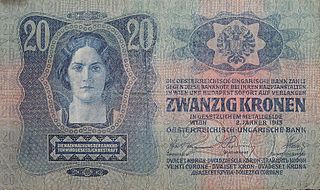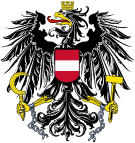
Austria-Hungary, also referred to as the Austro-Hungarian Empire, the Dual Monarchy or the Habsburg Monarchy, was a multi-national constitutional monarchy in Central Europe between 1867 and 1918. A military and diplomatic alliance, it consisted of two sovereign states with a single monarch who was titled both Emperor of Austria and King of Hungary. Austria-Hungary constituted the last phase in the constitutional evolution of the Habsburg monarchy: it was formed with the Austro-Hungarian Compromise of 1867 in the aftermath of the Austro-Prussian War and was dissolved shortly after Hungary terminated the union with Austria in 1918.

A telephone, colloquially referred to as a phone, is a telecommunications device that enables two or more users to conduct a conversation when they are too far apart to be easily heard directly. A telephone converts sound, typically and most efficiently the human voice, into electronic signals that are transmitted via cables and other communication channels to another telephone which reproduces the sound to the receiving user. The term is derived from Ancient Greek: τῆλε, romanized: tēle, lit. 'far' and φωνή, together meaning distant voice.

In telecommunications, a repeater is an electronic device that receives a signal and retransmits it. Repeaters are used to extend transmissions so that the signal can cover longer distances or be received on the other side of an obstruction. Some types of repeaters broadcast an identical signal, but alter its method of transmission, for example, on another frequency or baud rate.
Telecommunications in Austria encompass highly developed and efficient internet and telephone networks, complemented by a number of radio and television broadcast stations.

An emergency telephone number is a number that allows a caller to contact local emergency services for assistance. The emergency number differs from country to country; it is typically a three-digit number so that it can be easily remembered and dialed quickly. Some countries have a different emergency number for each of the different emergency services; these often differ only by the last digit.
A telephone numbering plan is a type of numbering scheme used in telecommunication to assign telephone numbers to subscriber telephones or other telephony endpoints. Telephone numbers are the addresses of participants in a telephone network, reachable by a system of destination code routing. Telephone numbering plans are defined in each of the administrative regions of the public switched telephone network (PSTN) and in private telephone networks.

Telephone numbers in Austria have no standard lengths for either area codes or subscriber numbers, meaning that some subscriber numbers may be as short as three digits. Larger towns have shorter area codes permitting longer subscriber numbers in that area.
A postal, telegraph, and telephone service is a government agency responsible for postal mail, telegraph, and telephone services. Such monopolies existed in many countries, though not in North America, Japan or Spain. Many PTTs have been partially or completely privatised in recent years, though a few, such as Posta ve Telgraf Teşkilatı of Turkey, Myanma Posts and Telecommunications of Myanmar and Tusass of Greenland, continue to remain wholly government-owned. In many of said privatisations, the privatised corporation was completely renamed, such as KPN in the Netherlands, Orange S.A. in France, BT Group in the United Kingdom, Eir in the Republic of Ireland, Swisscom in Switzerland, Telstra in Australia, Spark in New Zealand, Proximus Group in Belgium, A1 Telekom Austria Group in Austria, TDC Group in Denmark, Telia Company in Sweden and Finland, Telenor in Norway, Chunghwa Telecom in Taiwan and Singtel in Singapore; whereas in others, the name of the privatised corporation has been only slightly modified, such as Telkom Indonesia in Indonesia, Telekom Malaysia in Malaysia, Deutsche Telekom in Germany, Kosovo Telecom in Kosovo, KT in South Korea, Post Luxembourg in Luxembourg and Síminn in Iceland.
A trunk prefix is a digit sequence to be dialled before a telephone number to initiate a telephone call for the purpose of selecting an appropriate telecommunications circuit by which the call is to be routed.
B-Netz was an analog, commercial mobile radio telephone network that was operated by the Deutsche Bundespost in Germany from 1972 until 1994. The system was also implemented in neighboring countries Austria, The Netherlands and Luxembourg. The B refers to the fact that it was the country's second public mobile telephone network, following the A-Netz.

A1 Telekom Austria Group is a provider of a range of fixed-line, broadband Internet, multimedia services, data, and IT systems, wholesale as well as mobile payment services. It is a subsidiary of Mexican telecommunications conglomerate América Móvil since 2014, and its headquarters are in Vienna. The company operates subsidiaries in seven European countries: Austria, Belarus, Bulgaria, Croatia, North Macedonia, Serbia, and Slovenia. Its largest subsidiary is the Austrian telecommunications provider A1 Telekom Austria.
Austria was represented at the Eurovision Song Contest 2002 with the song "Say a Word", composed by Alexander Kahr, with lyrics by Robert Pfluger, and performed by Manuel Ortega. The Austrian participating broadcaster, Österreichischer Rundfunk (ORF), organised the national final song://null.zwei in order to select its entry for the contest.

Polizeiruf 110 is a long-running German-language detective television series. The name links to the emergency telephone number of the Volkspolizei. The first episode was broadcast 27 June 1971 in the German Democratic Republic (GDR), and after the dissolution of Deutscher Fernsehfunk the series was picked up by ARD. It was originally created as a counterpart to the West German series Tatort and quickly became a public favorite.
911, sometimes written 9-1-1, is the national emergency telephone number of the Philippines managed by the Emergency 911 National Office.

The postal history of Hungary is strongly linked to the history of Hungary. While a messenger system was brought to the Carpathian Basin by Árpád as early as 895, modern mail delivery was first organized by the Habsburgs under the Austrian Empire.

"Telephone" is a song by American singer Lady Gaga from her third extended play (EP), The Fame Monster (2009)—the reissue of her debut studio album, The Fame (2008). Featuring American singer Beyoncé, it was released as the EP's second single on January 26, 2010. Gaga and Rodney Jerkins wrote and produced "Telephone", with additional songwriting by LaShawn Daniels, Lazonate Franklin and Beyoncé. Gaga originally wrote the song for Britney Spears, who recorded a demo. "Telephone" conveys Gaga's fear of not finding time for fun given the increasing pressure for her to work harder as an artist. Musically, the song consists of an expanded bridge, verse-rap and a sampled voice of an operator announcing that the phone line is unreachable. Beyoncé appears in the middle of the song, singing the verses in a "rapid-fire" way, accompanied by double beats.

The economy of Austria-Hungary changed slowly during the existence of the Dual Monarchy, 1867–1918. The capitalist way of production spread throughout the Empire during its 50-year existence replacing medieval institutions. In 1873, the old capital Buda and Óbuda merged with the third city, Pest, thus creating the new metropolis of Budapest. The dynamic Pest grew into Hungary's administrative, political, economic, trade and cultural hub. Many of the state institutions and the modern administrative system of Hungary were established during this period.
Austria was represented at the Eurovision Song Contest 1984 with the song "Einfach weg", composed by Brigitte Seuberth, with lyrics by Walter Müller, and performed by Anita. The Austrian participating broadcaster Österreichischer Rundfunk (ORF), selected its entry through a national final.
Austria was represented at the Eurovision Song Contest 1982 with the song "Sonntag", composed by Michael Mell, with lyrics by Rudolf Leve, and performed by the band Mess, consisting of Fritz and Elisabeth 'Lizzi' Engstler. The Austrian participating broadcaster Österreichischer Rundfunk (ORF), selected its entry through a national final.












